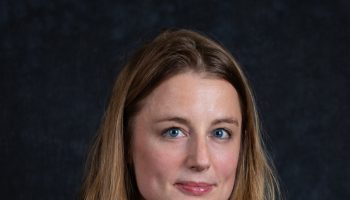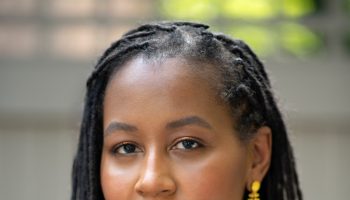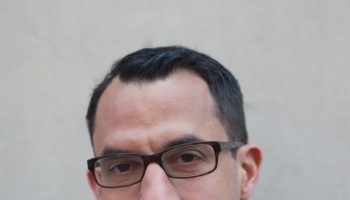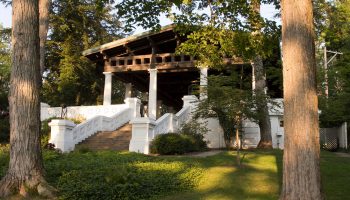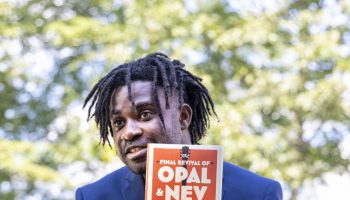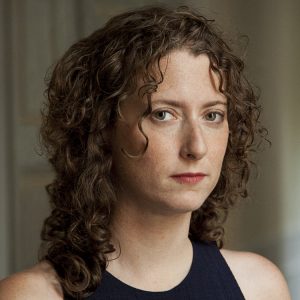
A self-proclaimed “ephemera hoarder,” prose writer-in-residence Jessica Bruder thinks that stuff — photographs, clothing, souvenirs — is a useful way to theorize about the ties that bind. That’s why she has asked her workshop participants to bring in artifacts that represent certain “circles” to which they belong as fodder for a week exploring “Narratives of Belonging” in her Week Two Chautauqua Writers’ Center workshop.
Brandon Som, author of the award-winning collection of poems The Tribute Horse, is the poet-in-residence for Week Two. Much like Bruder’s framing theme of the strange, malleable nature of belonging, Som will use his workshop’s focus on the poetic line to think through questions of community.
Both writers’ attention to kinship and community correspond to the Chautauqua Literary and Scientific Circle’s 2019 vertical theme “Collaborations,” and Week Two’s theme, “Uncommon Ground: Communities Working Toward Solutions.” Bruder and Som will kick off their residency at the Writers’ Center with readings at 3:30 p.m. Sunday, June 30 in the Hall of Philosophy.
In his morning workshop, “An Open Line to the World,” Som will emphasize the technology of the line through readings and prompts.
According to Som, because the line is one of the most basic and influential units of a poem, it doubles as “a great starting point” for both beginning poets and those coming to the workshop with more knowledge.
In between experimenting with free verse and traditional forms, Som hopes to interrogate the utility of the line. For Som, the line acts as a technical unit of poetry and a literal line of connection that leads to a world of possibilities.
“I want to think about why we choose to write in lines and what we can bring about through lines,” Som said. “I’m a big fan of talking to poets about their engagement with communities, their engagement with the outside world.”
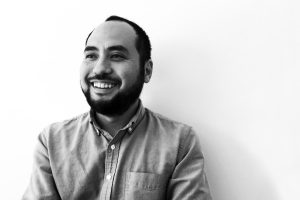
In other words, Som said, he wants to ask workshop participants to ponder the relation between writing and place. How can they use the poetic line to conjure up “wherever they call home,” to connect with communities to which they have access?
“Poetry is often talked about as connecting to music and sound,” Som said. “But I think it’s a really important time to maybe use those tools to listen (to) or be in tune with communities.”
The title of Bruder’s workshop — “Narratives of Belonging” — points explicitly to an exploration of community. The author of the 2018 CLSC selection Nomadland: Surviving America in the Twenty-First Century, Bruder has devoted much reporting to subcultures and “the ties that bring people together.” Nomadland, a New York Times Notable Book and Editors’ Choice and winner of the 2017 Discover Award, is a documentation of the older, itinerant Americans who travel the country searching for employment. The project spanned three years and Bruder spent months living out of a camper van alongside her sources.
“Nomadland is a subculture story,” Bruder said. “All these people are on the road, regardless of where they come from and what they’ve done before, (and)creating a family.”
For her workshop, Bruder will apply Armistead Maupin’s term “logical families” and the kinship ties found in her own work. She also cited David Grann’s “City of Water,” Rachel Aviv’s “Netherland” and Matthew Desmond’s Evicted as examples of stories that go deep into the relationships birthed from similar circumstance.
The first two are New Yorker articles about subcultures in New York City. Grann’s piece chronicles the lives of “sandhogs,” construction workers who toil underground beneath the streets, while Aviv’s follows a community of gay youth experiencing homelessness. The latter is a New York Times bestselling-book and a portrait of eight families on the verge of extreme poverty and eviction.
A “show-and-tell kind of girl,” Bruder hopes to dissect and share the “common languages that knit together subcultures” through the intimate artifacts that participants bring to the classes. Although she was tempted to offer up “neurotic journalists” as one of her own logical families, Bruder instead plans to explore what it means to be “in there” as a “participant observer of a subculture” while simultaneously maintaining a writerly distance — a paradox she has experienced time and time again in her reporting career.

